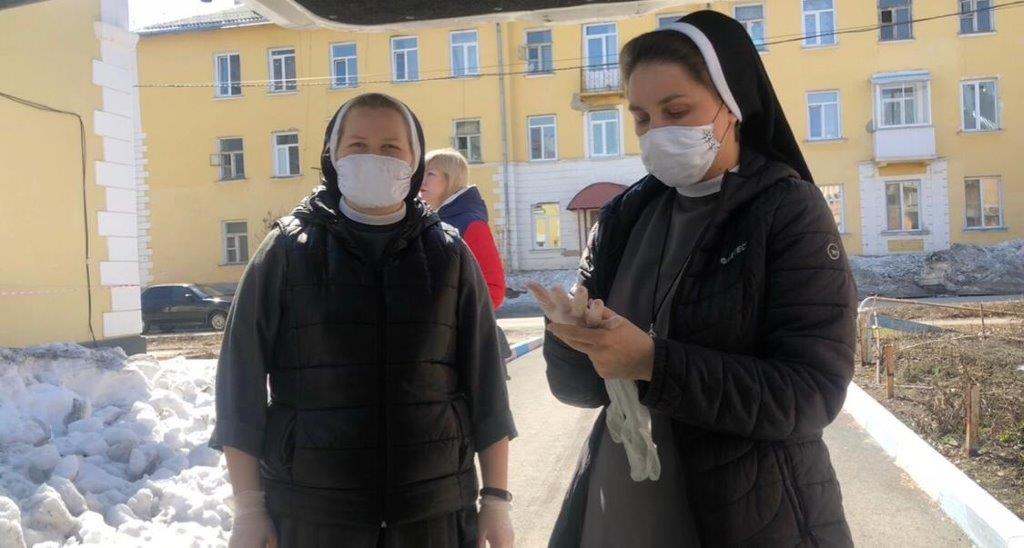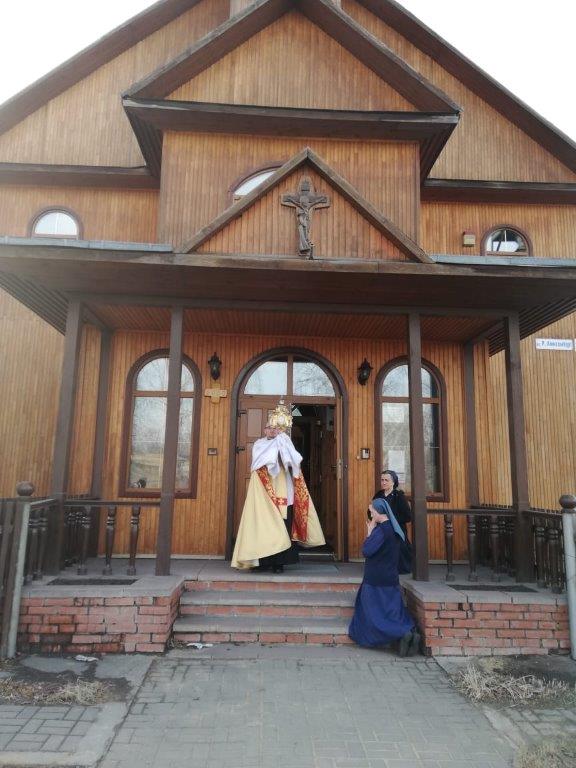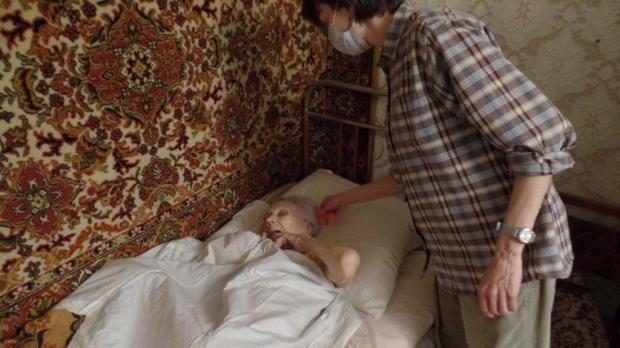Very few have fallen ill, but all who live in the million-strong West Siberian city of Novosibirsk are affected by the lockdown and its economic impact – particularly those, of course, who already were living on the fringes of society prior to the crisis: the poor, the unemployed, the elderly and children from lower-income families. These are the ones on whom the religious sisters of the Roman Catholic Diocese of the Transfiguration at Novosibirsk have now focused most of their attention. They talked with the international Catholic charity Aid to the Church in Need about the challenges they are facing during these times of the pandemic.
In Russia, the first confirmed case of Covid-19 was registered as early as January 20. This case was followed by just over half a million infected, 7478 deaths and what is assumed to be a much higher number of unknown cases (as at June 17). In response, a nationwide lockdown was imposed, which is only gradually being eased now. Moscow is at the epicenter of the crisis; however, the virus continues to spread across Siberia, even though to a much lesser extent. In the metropolitan area of Novosibirsk alone, 4604 cases of Coronavirus have been registered, 62 people have died.

Even in times not marked by pandemic, the work of these religious is a Herculean task. Sister Theresa Witschling, a religious of German descent of the Daughters of Charity of Saint Vincent de Paul, describes it as follows, “Russia – Siberia; the people call this region ‘a house without a roof’. A region that, throughout its history, has accepted countless exiles and people forced to relocate. Many of them died a martyr’s death. They starved to death, died performing forced labour under inhumane conditions, were killed by the cold. The long, cold winters and the short, hot summers make it unmistakeably clear: life here is not
About one million people with Catholic roots live in the Diocese of the Transfiguration in West Siberia, most of them of Ukrainian, Polish or German descent. The diocese covers an area of 2 million square kilometres. About 40 priests serve in its 70 parishes, covering enormous distances as they go about their ministry. Without the assistance of the religious sisters, it would be impossible to provide pastoral care for the faithful living scattered across the diocese.
For this reason, Sister Theresa and two fellow religious relocated to Siberia in 2015 in spite of the inhospitable conditions. Since then, the Daughters of Charity have operated a state-run and a church-run children’s center in Slavgorod, a town located southwest of Novosibirsk.
“Most of the children here are from lower-income families and have a difficult home life with practically no parental care. No matter whether both parents are out working all day for little pay or one of the parents has found work in another country and is gone for months at a time to secure the family’s livelihood, the children are left to their own devices far too often.”
The religious do homework with them, offer a range of cultural projects and make sure that one hundred children have access to a paid school lunch, often the only warm meal the children receive all day. In addition, twice a year – in the summer and in the winter – they invite the children to spend “holidays with God.”
This all changed with the pandemic. “It has made our work here more complicated. Many people have lost their jobs, or at least their wages have been cut. They knock on our door asking for help, if only for a piece of bread for the children.”
The religious have begun sewing masks; as everywhere else in the region, there are not enough face masks available, and they hand them out to those in their care. The religious are particularly beloved among the homeless of the city. “These people all have their painful memories and emotional wounds. They do not come to us solely for material assistance. They are just grateful to receive a little kindness and warmth.” However, this is not the only thing that gives the people comfort and hope. “We thank God that we are able to celebrate the Eucharist every day. We are holding daily worship services in response to the pandemic. At the end of the service, the priest goes out on the street with the monstrance and blesses the parish and city with the divine offerings.”
Overcoming distance
In Surgut, 1000 kilometres north of Novosibirsk as the crow flies, two Angelic Sisters of Saint Paul from Poland have become veritable angels for the 140 homeless people in a social rehabilitation facility. They organize clothing and food drives in the parish, which have become crucial for survival in these difficult times.

The religious community first came to Surgut in 2011, taking up permanent residence there in 2015 to support the pastoral ministry of the parish of St. Joseph. This is the only place that has a “real” church. Thanks to the initiative and generosity of a number of Catholics, additional chapels have been set up in private homes in Noyabrsk, located 320 kilometres from Surgut, and in Kogalym, located 190 kilometres away. Every two weeks, the religious sisters visit these chapels in the company of a priest – at least in normal times. “It is important to build up personal relationships with the faithful,” Sister Tereza Jakubovska explains. Her dream is to have chapels available in all places where there are Catholics. More crucial than ever, and therefore more sorely missed, is the ability to participate in divine services. Like many other religious communities, the Angelic Sisters in Surgut are broadcasting Holy Mass live every day to offer daily spiritual encouragement. “This ensures that we keep in touch.”
This is also the objective of Sister Aljona Alakschova of the Dominican Sisters of Bethany, who, together with a fellow religious, has been serving in the Parish of the Divine Mercy in Ishim for 20 years. “There are few Catholics here and those who are here live scattered across the local villages. When they take the bus to attend Holy Mass on Sundays or feast days, they know that they will have to wait for long periods of time before they can travel back in the late afternoon. We shorten their wait by serving them meals and talking with them. There is no better opportunity to get to know the people in the parish,” Sister Aljona confirms.
“Everything has become more difficult since the Coronavirus. Public transportation runs even more seldomly, private shared taxis arrive sporadically and rarely according to schedule. This makes it difficult for us to visit those who are sick and to bring groceries and medicines to elderly people who have no one else.” Divine services now have to be celebrated without the congregation. However, necessity has always been the mother of invention. The religious have now set up a WhatsApp group, which connects parish members and keeps everyone up to date. This service is also used to send out the links to livestream services.
The lockdown presents a challenge to all communities of religious sisters in the diocese. The Sisters of Saint Elizabeth in Novosibirsk miss visiting parish members. “Through our regular visits we became friends. They often said to us as we took our leave, ‘Please don’t leave me, Sister. Please come back!’” This is where the good old telephone comes in, it helps the religious sisters of Saint Elizabeth in Novosibirsk stay in touch with all those who are not yet part of the worldwide network, particularly older people who suffer the most under social distancing.
Like most congregations, the Servants of the Lord and the Virgin of Matará in Omsk have shifted their pedagogical efforts completely into the virtual realm. They teach catechesis via video conferences, have made short videos together with adolescents to boost morale and have developed lively pedagogical activities for the province of their monastic order that are being used far beyond the borders of Omsk. “We hope that our work inspires adolescents to think about God’s word, even in these times of the Coronavirus. We pray that these, from a human perspective terrible times, will help us and all people to grow in faith, in hope and in love for God and our neighbours,” Mother Maria Glum explains.
Prayer: The most powerful remedy
The Carmelites in Novosibirsk, the only contemplative community in the diocese, are battling this pandemic with the most powerful instrument that we Christians have – prayer. Sisters Teresamaria, Christina and Agnija write, “We pray for the healing of the sick, comfort for those who are suffering, relief for medical workers and for the protection of the most vulnerable groups of people against infection. We also pray for the scientists who are working to develop medicines and a vaccine for the virus and have not forgotten those working in government, who have to solve far-reaching socio-economic problems. In gratitude for the aid that we receive from you, we also include ACN and its benefactors in the prayers we offer up to Our Lord.”
ACN International supports all 68 religious sisters who are serving at 18 locations in the Diocese of the Transformation at Novosibirsk. “It would not merely be a disappointment, but a catastrophe, for the religious sisters” if this aid were discontinued, the local bishop, Msgr. Joseph Werth, confirms. This is even more true in these times of crisis, when collections are no longer being taken in the parishes.
For many decades, ACN has also supported the communities of religious sisters in the other three Roman Catholic dioceses in Russia (Moscow, Irkutsk and Saratov) with educational and subsistence aid as well as funding for building projects, the renovation of housing and for transportation.

